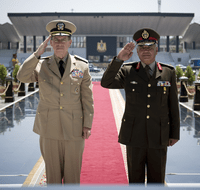When U.S. President Barack Obama meets with Egyptian President Hosni Mubarak in Cairo tomorrow, they may want to focus some attention on the most enduring but unexamined component of the U.S.-Egypt relationship: military cooperation. Over the past 30 years, military cooperation has yielded great benefits for both countries. But that cooperation now shows signs of strain, and a course correction is in order.
Operationally, the U.S. enjoys privileged access to Egypt's air space and waterways. That meant expedited permission for more than 35,000 over-flights and 850 naval transits from 2001 to 2005. Strategically, Egypt has largely supported -- or else refrained from blocking -- major U.S. military operations in the Middle East, even in contentious circumstances. Unlike Turkey, for instance, which refused access to U.S. forces heading to Iraq, Egypt facilitated transit of the 4th Division through the Suez Canal. Egypt, for its part, has used a lucrative U.S. military assistance program of $1.3 billion per year to modernize its forces. As a result, Egypt's military, which in 1979 was equipped entirely with Soviet weaponry, today fields a majority of U.S.-made hardware.
But despite these healthy surface indicators, bilateral disagreements over mission, operations, and weapons sales have strained the relationship.

